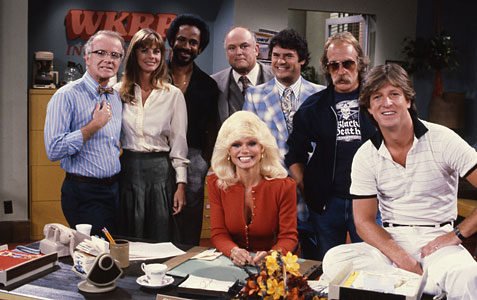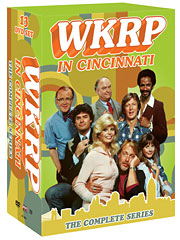Cult classic sitcom “WKRP in Cincinnati,” now making its complete series DVD debut, takes viewers to a much different time – a time before iPods and Sirius, when AM radio was still a very real thing that people listened to and relied on for news and entertainment. Yes, radio once upon a time had character, and helped dictate and define our culture, pop and otherwise. Running for four seasons on CBS, from 1978 to ‘82 – a time of major transition in America – “WKRP” was a wacky workplace comedy that helped pave the way for shows like “The Office,” “30 Rock” and “Parks and Recreation” today. To discuss what makes the series tick, one must first understand its lunatic cast of characters, who are at the root of every episode, every laugh and every plot development. There are eight principles that can be broken down into three categories.
Management: Arthur Carlson (Gordon Jump) is WKRP’s sometimes bumbling but always good-hearted station manager, also known affectionately as “The Big Guy.” Though from time to time he appears to possess a modicum of business acumen, for the most part, he’d rather not be bothered with the day-to-day operations of the station, instead focusing on his hobbies, which include fishing and model trains. The series kicks off with Carlson’s hiring of Andy Travis (Gary Sandy) as the station’s new program director. The level-headed center of the bunch, Travis has been living town to town, up and down the dial, and doesn’t see WKRP as anything more than another stop in his career of rebranding stations and making them profitable. Soon enough, he’ll discover there’s something special about this station that keeps him from moving on to the next one. Jennifer Marlowe (Loni Anderson), Carlson’s bombshell-with-brains secretary, shouldn’t technically fit under management, and yet as the series progresses, it becomes all too clear that without the glue that is Jennifer, the entire enterprise would fall to pieces.
The Disc Jockeys: Dr. Johnny Fever (Howard Hesseman) is the station’s morning drive man. Like Travis, Johnny’s worked at more stations than he can remember, though that may have more to do with years of drug and alcohol use, which is more hinted at than ever explored. Fever is the show’s wild card, and “WKRP” never shies away from throwing bizarre, unpredictable plotlines in his path. Venus Flytrap (Tim Reid) is Andy’s first move upon changing the station’s format to rock and roll, hiring the jock “away from a station in New Orleans.” Shrouded in a mysterious past, Venus takes care of the evening shift, playing soothing, laid-back tunes for the greater Cincinnati area. “WKRP” peels away the Venus onion, giving him a little more backstory every season, and one of the show’s very last episodes (“The Creation of Venus”) brilliantly redefines his introduction way back in the two-part pilot.
News, Sales and Promotion: Bailey Quarters (Jan Smithers), the Mary Anne to Jennifer’s Ginger, is the brainy, practical wallflower that starts out in promotions, eventually working her way up to news. There’s often the possibility that something romantic might develop between her and Fever, but “WKRP” always stops just short of going there. Herb Tarlek (Frank Bonner) and Les Nessman (Richard Sanders) together are the show’s ever reliable double act for side-splitting comedy. The former is the crass, sexist sales manager with a comically misplaced sense of fashion. (Oddly, most of Herb’s atrocious wardrobe can be found broken up and spread out across the hipster cultural landscape of today.) The latter is the seemingly nebbish news director and on-air personality. Bespectacled and perpetually covered in band aids, Les is the most effective weapon in the “WKRP” arsenal, and far stronger and deeper than he at first glance appears. Though they’re chiefly remembered for their ability to mine big laughs, there’s a genuine sense of pathos that hounds both throughout the series. Much of the brilliance of “WKRP” comes directly from the flawed nature of its inhabitants, and it’s never more evident than in the show’s pitch perfect understanding of Herb and Les.
The first season of “WKRP” fires on plenty of cylinders by unveiling one episode after another of inspired, off-the-wall comedy, often arising from the clash of personalities among the staff. Some of the show’s best-known and most treasured episodes are from its freshman season. “Hoodlum Rock” features a snotty, violent band called Scum of the Earth invited to the station with unpredictable results; “Fish Story” has Herb dressing up like a fish for promotional purposes (WKRP = carp, get it?), only to end up in a restroom altercation with a mascot from rival station WPIG; “A Date with Jennifer” features a classic sight and sound gag involving Les, a toupee and Foreigner’s “Hot Blooded”; and “Turkeys Away,” undeniably the show’s most infamous and popular installment, centering on a Thanksgiving promotion gone horribly wrong, was the seventh episode aired.
Though “WKRP” knew exactly what it wanted to be coming out of the gate, over time, it was unafraid of being other things as well, and in its second season, rather than continually being at odds with each other, the characters morphed into much more of a dysfunctional family unit. The show stretches itself into more dramatic territory as well. One of the strengths of the series is its ability to shift back and forth from comedy to drama at the drop of a hat, or even to do an entire episode rooted in a serious subject if need be. Perhaps no episode of “WKRP” is more important in that regard than “In Concert,” which was written and produced to directly address the very real deaths of eleven people at a Cincinnati Who concert on December 3rd of 1979. The episode aired the following February. The self-explanatorily titled “God Talks to Johnny” won a Humanitas Prize, and one masterful episode, “Baseball,” takes place almost entirely on the field of a softball game.
Season Three continued down the path of the experimental, addressing a wide range of topics. Two Herb-centric episodes – “Real Families” and “Frog Story” – are undeniable classics. In the former, Tarlek and family go on a reality series that aims to poke holes in the average American household. The latter features a distressed Herb, who’s accidentally killed his daughter’s pet frog by painting it pink. In an hour-long installment, “Dr. Fever and Mr. Tide,” Johnny suffers a breakdown by developing a split personality as a result of his enormous success as the host of a crappy disco TV show. Let’s be clear about one thing: “WKRP” never jumped the so-called shark. It never had the chance. Having said that, if there’s a weak section of the series, it might be the second half of season three, which tends to get a little too serious and preachy, too much of the time.
In Season Four, the show was firmly back on track, offering up a solid concoction of everything that had ever made the series artistically successful, and then some. Though Mama Carlson (Carol Bruce) had featured from time to time in previous seasons, she, along with her wily butler Hirsch (Ian Wolfe), gets far more screen time in the show’s final year, and cat and mouse business games between her and Andy are frequently at the center of the show’s last call. Bruce, a stage and Broadway veteran, is a treasure, and well deserving of being designated the show’s unofficial ninth cast member.
“WKRP” was treated badly by CBS over its last two seasons (the show allegedly had 12 different timeslots over its four years), and without warning, it wasn’t renewed for a fifth. Its enormous popularity came when it entered into syndication, with affiliates in probably every major American city running the 90 episodes over and over for the remainder of the 1980s.

DVD Review: Aside from the first season, the show’s been largely unavailable for at least 20 years, meaning that most anyone under the age of 30 is likely unfamiliar with it. If you’re one of those people, this box set is your key to experiencing one of the great TV sitcoms, and you’ll quickly find yourself binge-watching. Despite its age, its topics and gags remain relevant and hilarious today.
A few die-hard fans will be upset that this tune or that one wasn’t able to be secured, despite Shout’s best efforts to present a set that would satisfy. Yet this box is far more complete than the frequently butchered first season collection Fox released seven years ago (though I still maintain that set was better than no “WKRP” set at all). For the record, I consider myself a pretty die-hard fan, though not die-hard enough to do some massive compare and contrast to figure what didn’t get cleared. What I can tell you is that the spirit of rock and roll is alive and well on this box set, and it is often amazing the lengths that Shout went to secure music that’s frequently only on the soundtrack for seconds at a time.
The video quality is sharp enough for a 35-year-old series shot on videotape, though the images improve as the series moves forward. Speaking of that Fox DVD, fans may not want to part with it just yet, as it features the broadcast version of “The Contest Nobody Could Win,” whereas this set features a version of that episode with a completely different ending, including a distinct lack of Vincent Schiavelli. Episodes run between 24 and 25 minutes each, which seems to be about right for the time period. If any cuts to the material have been made, they are minor and unnoticeable.
Extras are pretty sparse, as the bulk of the budget for this set surely went toward the music clearances. Bonus features are on a separate disc, and they include a 45-minute Paley Center reunion featuring creator Hugh Wilson, Anderson, Hesseman, Smithers, Reid and a couple of the directors from the series, as well as a surprise phone call from Gary Sandy. Though it isn’t listed on the box set artwork, there’s also a separate interview with Sandy that runs for 25 minutes. Lastly, there are two short featurettes that have been ported over from the Fox disc, though the commentaries from that set are absent, so yet another reason to not ditch it.
Hey, Shout! Since you successfully managed to do what many claimed was impossible, how about next looking into “The New WKRP in Cincinnati”?






















